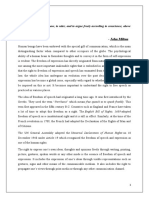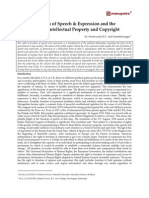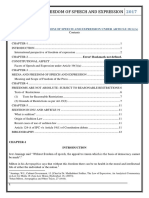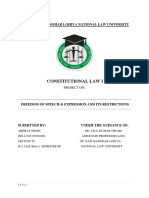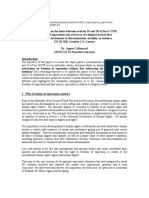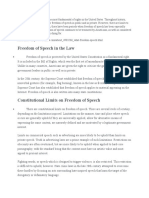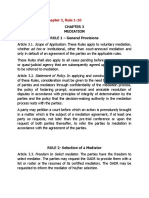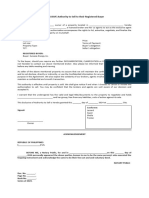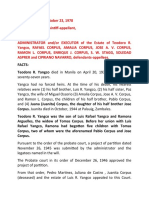Introduction
Freedom of speech and expression is regarded as first condition of liberty. It
holds a preferred & important position in the hierarchy of the liberty , it is said
that freedom of speech is the mother of all the other liberties. Freedom of
speech is a principle that supports the freedom of an individual or community
to express their opinion & ideas without fear of retaliation, censorship, or legal
sanction.
The right to freedom of speech and expression has been recognized as a
human right in the Universal Declaration of Human Rights1 & International
Human Rights Law by the UN2.
Freedom of speech & expression means the right to express one's own
convictions & opinions freely by words of mouth, writing, printing, pictures, or
any other mode. It thus includes the expression of one’s ideas through any
communicable medium or visible representation, such as gestures, signs &
the like.3
The expression connotes also publication and thus the freedom of the press
is included in this category. Free propagation of ideas is the necessary
objective and this may be done on the platform or through the press. The
freedom of propagation of ideas is secured by freedom of circulation. Liberty
of circulation is essential to that freedom as the liberty of publication. Indeed,
without circulation the publication would be of little value.4
The freedom of speech & expression includes liberty to propagate not one’s
views only. It also includes the right to propagate or publish the views of other
people,5 otherwise this freedom would not include the freedom of the press.
International position on Freedom of Speech and Expression
The concept of freedom of speech originated long back.
England’s Bill of Rights 1689 adopted freedom of speech as a constitutional
right and still in effect. The French Revolution in 1789 adopted the Declaration
of Rights of Man and of citizen. This further affirmed the freedom of speech
as an undeniable right.
The Declaration of Freedom of Speech in Article 11 states
“The free communication of ideas and opinions is one of the most precious of
the right of man. Every citizen may, accordingly, speak, write and print with
freedom, but shall be responsible for such abuses of this freedom as shall be
defined by law”.
1
UDHR : 10 Dec 1948.
2
United Nations : 24 oct 1945.
3
Lowell vs Griffin, (1938) 303 US 444.
4
Ramesh Thapper vs State of Madras, AIR 1950 SC 124 ; Life Insurance corpn
of India vs Manubhai D. Shah, (1992) 3 scc 637.
5
Srinivas vs State of Madras, AIR 1931 Mad 70.
�The Universal Declaration of Human Rights that was adopted in the year 1948
also states that everyone should have the freedom to express their ideas and
opinions. The freedom of speech and expression is recognized as a human
right under Article 19 and has now formed a part of the international and
regional human rights law. In International human rights the freedom of
speech and expression is recognized in International Covenant on Civil and
Political Rights (ICCPR). Article 19 of the ICCPR states that-
“Everyone shall have the right to hold opinions without interference and
everyone shall have the right to freedom of speech and expression ; the right
shall include freedom to seek, receive, and impart information and ideas of all
kinds, regardless of frontiers either orally or the form of writing or print, in the
form of art, or through any other media of their choice”.
Many countries have constitutional law that protects free speech. Terms like
freedom of speech and freedom of expression are used interchangeably in a
political discourse.
However freedom of speech and expression may not be recognized as being
absolute , and common limitations or boundaries to freedom of speech relate
to libel, slander, obscenity, pornography, sedition, incitement, fighting words,
hate speech, classified information, copyright violation, trade secrets, food
labeling, non disclosure agreements, public security and perjury. Justification
for such proposed by Jon Stuart Mill which suggests that “the only purpose
for which power can be rightfully exercised over any member of a civilized
community, against his will, is to prevent harm to others”.6
John argued that without human freedom there can be no progress in science,
law or politics, which according to him required free discussion of opinion.
Over a century ago, in Abrams vs United States7, one of the earliest instances
to interpret and develop the thesis that would come to occupy a important
place in America’s legal character, Justice Oliver Wendell Holmes expressed
his dissent, claiming that free speech has always been a never ending
endeavour. It is closely linked to democracy. Freedom of expression is a
fundamental characteristics of the United State constitution, according to
First Amendment.
A strong democracy and a healthy society have long valued the right to
freedom of speech and expression. For a democratic polity, it has been
regarded to be fundamental and indivisible. It is democracy's fourth pillar.
Democracy refers to a governmental system that is of, run by, and is for the
people. As a result, democracy lies in the hands of the general public, and the
right to free and open expression is critical to the state's healthy functioning.
The right to free speech is a tool that allows humans to live in dignity rather
than as mere animals. It has been said that without access to free and
unfettered speech and expression, democracy is meaningless.
In Whitney v. California,8 Louis Brandies J, made a classic statement on the
freedom of speech in the context of the U.S Constitution:
“Those who won our independence believed that the final end of the state was
6
On liberty by John Stuart Mill 1859
7
Abrams v. United States, 250 U.S. 616
8
Whitney v. California, 274 U.S. 357
�to make men free to develop their faculties. They believed liberty to be secret
of happiness and courage to be the secret of liberty. They believed that the
freedom to think as you will and to speak and assembly discussion would be
futile... that public discussion is a political duty; and that this should be a
fundamental principle of the American government.”
Interpretations of both the harm and offense limitations to freedom of speech
are culturally and politically relative. For instance, in Russia, the harm and
offense principles have been used to justify the Russian LGBT propaganda
law restricting speech (and action) concerning LGBT issues. Many European
countries outlaw speech that might be interpreted as Holocaust denial. These
include Austria, Belgium, Canada, the Czech Republic, France, Germany,
Hungary, Israel, Liechtenstein, Lithuania, Luxembourg, Netherlands, Poland,
Portugal, Russia, Slovakia, Switzerland and Romania.
In some countries, blasphemy is a crime. For example, in Austria,
defaming Muhammad, the prophet of Islam, is not protected as free speech.In
contrast, in France, blasphemy and disparagement of Muhammad are
protected under free speech law.
Freedom of speech and Expression in India
The Constitution of India guarantees various fundamental rights to its citizens.
One such important right is right to freedom under Article 19. This includes
right to freedom of speech and expression, right to assemble peacefully and
without arms, freedom to form associations and unions, right to move freely
throughout the territory of India, right to reside and settle in any part of the
territory of India and right to practice and profession or to carry on any
occupation, trade or business.
Article 19(1)(a)guarantees that all the citizens have the right to freedom of
speech and expression . This right is available only to the citizens of India and
not available to any person who is not a citizen of India i.e. foreign nationals.
Right to free speech has been broadened to encompass the right to receive &
transmit information. In State of Uttar Pradesh v. Raj Narain9 , the Supreme
Court concluded that Article 19(1)(a) of the constitution bestows upon every
citizen the right to indulge in free speech, as well as the right to receive and
spread information on topics of public importance. The freedom to collect
and communicate information is included in Article 19(1)(a) of the
constitution of India, according to Secretary, Ministry of Information and
broadcasting, Govt. of India v. Cricket Association of Bengal10.
Freedom of speech also includes the right to silence.
9
1975 AIR 865, 1975 SCR (3) 333
10
1995 AIR 1236, SCC (2) 161
�In the case Bijoe Emmanuel v. State of Kerala11, in this case three students
were expelled from their school in 1985 for not singing the national anthem of
India. Since they were from the religious background of Jehovah’s witnesses,
they just stood silently during the national anthem of India in the School’s
morning assembly. After they were expelled from school, their father filed a
writ petition in the High Court of Kerala stating that the expulsion was a direct
violation of their fundamental right which is Freedom of speech and
expression and freedom of religion which is protected by the Indian
Constitution under Article 19 and 25. The court dismissed the case and stated
that “no words or thoughts in the national anthem was capable of offending
religious convictions”. Under Article 136 of the Constitution of India, their
father later filed a special leave petition in the Supreme Court of India.
The Supreme Court held that the expulsion of school children merely for not
singing the national anthem was a direct violation of their right to freedom of
expression. It was stated that there were no provisions of law that made the
three students or any individual obliged to sing the national anthem and the
state of Kerala’s department of education lacked statutory force to require
school children to participate.
Freedom of speech and liberty of the press
Free speech is truly vital in a democratic setup, especially accompanied by a
free press. Great thinkers like Voltaire, George Orwell, Thomas Jefferson, and
Calvin Coolidge have aptly expressed their views in favor of the freedom of
the press. The press's right to freedom, which is implied in the right to free
speech, is critical for political autonomy and democracy's efficient operation.
The freedom of the press is a subpart of the bigger domain of freedom of
speech and expression.
Freedom of Press is nowhere mentioned is nowhere mentioned in the Indian
Constitution. It is believed to be covered under Freedom of Speech and
11
AIR 1987, SC 748
�Expression. Hence, the rights of a common citizen are the same as the rights
of a media or press house.
The media has certain rights to challenge the government and showcase the
issues gaining rapid attention by the people through various media sources
and houses. Some rights are : Right to publish and circulate, Right to receive
information, Right to conduct interviews, Right to report court proceedings,
Right to advertise.
However, there are certain restrictions in Article 19(2) to protect the nation
and its integrity. The restrictions can be imposed in cases of threats against:
Sovereignty and integrity of India, Security of the state, friendly relations with
foreign states, public order, decency or morality, contempt of court,
defamation, incitement to an offence.
In Indian Express Newspaper v. Union of India12, speaking about the utility of
freedom of press the court observed, “The expression “freedom of press” has
not been used in Article 19 of but it is comprehended within Article 19(1)(a).
The expression means freedom from interference from authority which would
have the effect of interference with the content and circulation of newspapers.
There cannot be any interference with that freedom in the name of public
interest. The purpose of the press is to advance the public interest by
publishing facts and opinions without which a democratic electorate cannot
make responsible judgements. Freedom of the press is the heart of social and
political intercourse. It is the primary duty of the courts to uphold the freedom
of the press and invalidate all laws or administrative actions which interfere
with it contrary to the constitutional mandate.”13
Conclusion
It is reasonable to argue that the value of free expression is defined by the
magnitude to which citizens may exercise it. The right to free speech is a
fundamental civil right. It acts like the rock on which democratic governance
is built. It is also necessary for the democratic process to work properly. Every
12
1985 SCC (1) 641.
13
In Re Harijai Singh, AIR 1997 SC 73.
�person has the right to freely express themselves and put forward their views.
Speech is necessary because it allows a person to communicate his or her
ideas, feelings, and sentiments to others. It is a natural right that a human
being receives at birth. As a result, no individual must be deprived of this
fundamental right to free speech.


